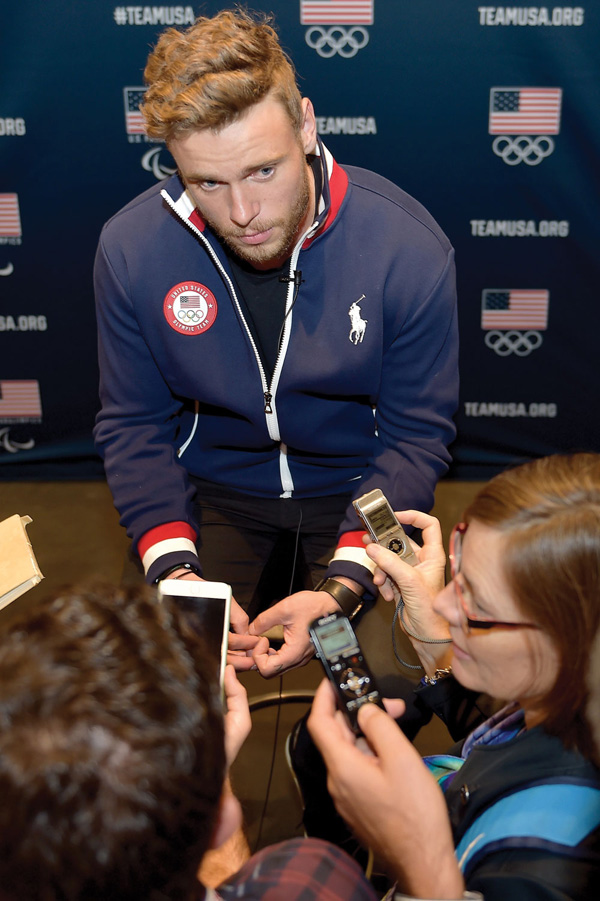Editor’s note: This story is updated from the print edition.
Martina Navratilova once said she lost $10 million in endorsements when she told the world she was gay in 1981. A generation later, coming out of the closet was undeniably good business for Gus Kenworthy, a freestyle skier who has vaulted into the upper tier of marketable Team USA athletes heading into the Pyeongchang Winter Games.
As a good-looking, outgoing silver medalist who helped rescue stray dogs in Sochi, Kenworthy would have had plenty of calls from sponsors regardless. But when he told ESPN Magazine in 2015 he’s gay, he added the factor that makes all the difference to marketers: A distinctive personal story that highlights a diversity theme.
He’s already signed with Visa, Toyota, Ralph Lauren, Deloitte and 24 Hour Fitness, and his agent, Wasserman’s Michael Spencer, says at least two more Olympic deals are coming. Those are on top of his long-term relationships with Monster Energy, Atomic skis and Smith goggles. He’ll be featured in Visa’s marketing and extensively profiled on NBC broadcasts. Olympic insiders say nearly every USOC or IOC sponsor inquired about his availability.
 |
Gus Kenworthy, a silver medalist in Sochi, has signed several deals heading into 2018.
GETTY IMAGES |
“It’s absolutely true — I think I’m more marketable now as an out athlete,” Kenworthy said. “Every brand is looking for diversity, and it’s an important thing for brands to have diversity, more so than it’s ever been.”
Kenworthy, 26, says he doesn’t want to be known only for his sexual orientation, and he’s talked with sponsors about finding the right balance in their personality-based campaigns. But he’s eager for the wider platform to speak to those struggling with their sexuality.
“If I had seen an out gay athlete who was getting big sponsors and having a successful career and doing well competitively — that would have given me so much hope,” he said.
Olympic partners have always been more invested in diversity than most sports marketers, because of the relative anonymity of the athletes and the unpredictability of Olympic qualifying. “You need a well-rounded team,” said David Schwab, founder of Octagon First Call and a consultant to brands. “You hear that so often. And one that is symbolic of America, and that could be gender, age, disability, sexual orientation or sport.”
Some sponsors, like Visa, are specifically looking to tell a message of acceptance. “We certainly like individuals who stand for the concept of acceptance, and the concept of diversity,” said Chris Curtin, chief brand and innovation marketing officer. “And not just stand for it themselves, but embrace it in others as well.”
Others just want athletes who authentically garner public interest beyond their niche sports, Schwab said. At the recent Team USA media summit, more than a dozen reporters swarmed Kenworthy’s stage for 45 minutes while other Olympians held court with groups of three or four.
If anything, Kenworthy is just catching up to corporate America’s demand. Many big businesses have funded gay pride celebrations for decades and are eager to be seen as progressive. During the Rio Games, Nike hired transgender duathlete Chris Mosier to appear in a commercial despite his sport not even being in the Olympics.
Out Olympians are hardly unprecedented, said Jim Buzinski, co-founder of Outsports, a website devoted to gay issues in sports. Fifty-five openly gay athletes competed in Rio in 2016, up from 23 in London in 2012. Seven competed in Sochi in 2014, according to Outsports. But relatively few have been American, and the best-known gay Olympians came out after their careers peaked, such as Greg Louganis or Brian Boitano.
That makes Kenworthy the first athlete who has undeniably profited from, not merely survived, the coming-out process.
Despite his silver medal and Sochi dogs story, Kenworthy is largely unknown outside of skiing circles. About 8 percent of Americans know his name, according to the Davie-Brown Index, compared to 62 percent knowing the most famous active U.S. Winter Olympian, Shaun White. In part due to his coming out, Kenworthy will grow much more famous in the coming months.
“It’s unique,” Buzinski said. “It’s encouraging and inspiring. [Coming out] is a very personal process, but if you’re ready, that’d be a reason to do it. Who would Gus Kenworthy be if he didn’t come out? No offense, but freestyle skiers are not exactly household names.”




